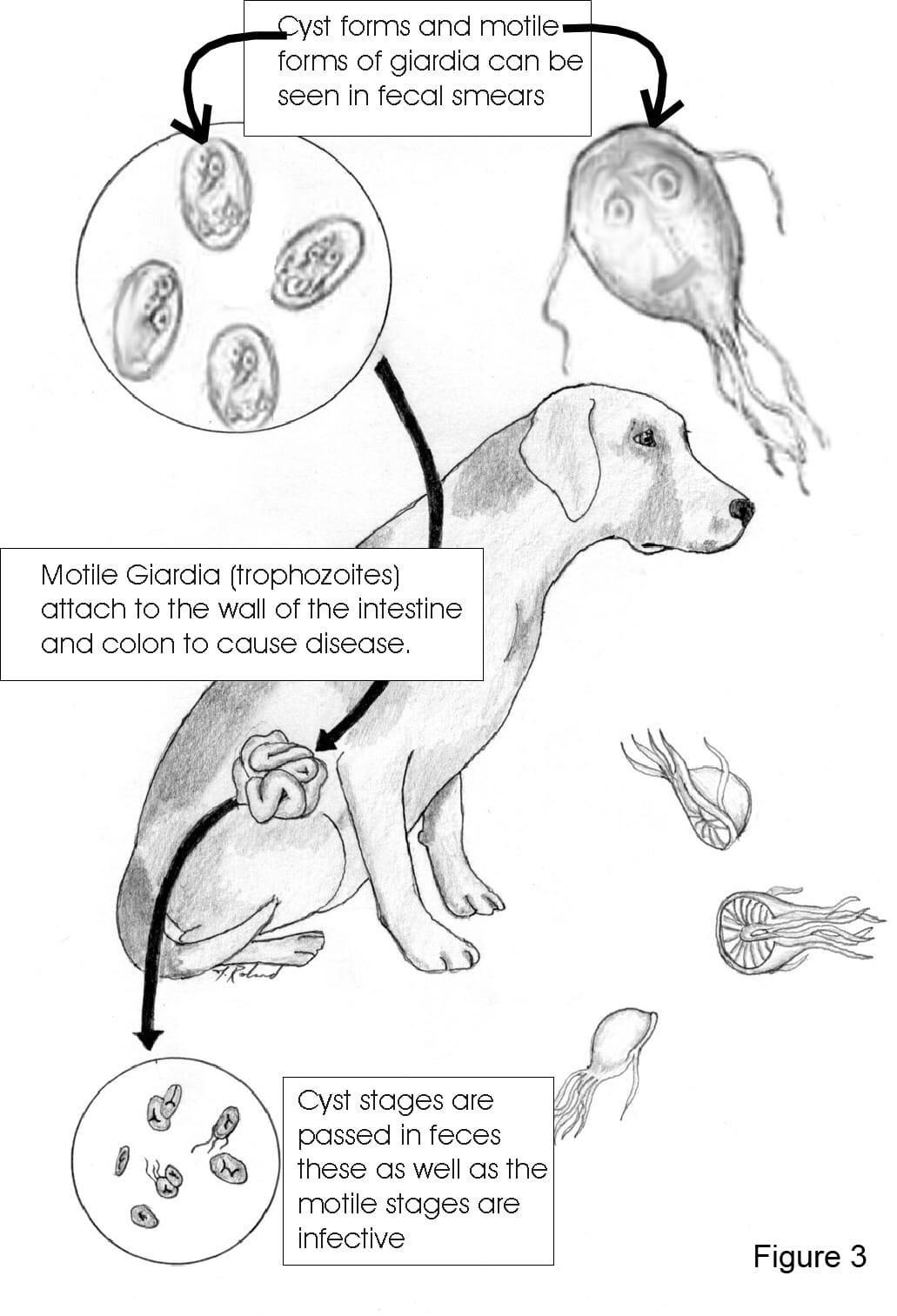Giardiasis is a prevalent parasitic infection that can lead to diarrhea in dogs. This condition is caused by an intestinal parasite known as Giardia, which thrives in environments contaminated with feces, including soil, food, and water. While some dogs may exhibit no signs of infection, younger dogs or those with compromised immune systems are more susceptible to developing symptoms. Given the ease with which dogs can reinfect themselves with Giardia, successful treatment necessitates a combination of effective anti-parasitic medications, rigorous cleaning, and diligent management of both indoor and outdoor environments. Understanding the lifecycle of Giardia and implementing proper preventative measures are crucial for safeguarding your dog’s health.
Causes of Giardiasis in Dogs
Dogs contract Giardia by ingesting contaminated water, soil, food, or objects. The parasite exists in two forms: trophozoites, which inhabit the intestines of infected dogs, and cysts. Cysts are essentially trophozoites protected by a durable outer shell and are expelled in the dog’s stool. These cysts are remarkably resilient, capable of surviving in the environment for months, and are immediately infectious. Even a small number of ingested cysts can trigger an infection. A dog can easily become reinfected through self-grooming, particularly if cysts remain on their fur, paw pads, or hindquarters. This persistent cycle underscores the importance of thorough environmental cleaning and treatment.
Clinical Signs of Giardiasis
Many dogs infected with Giardia remain asymptomatic, maintaining normal appetite and energy levels. However, in more severe cases, symptoms can manifest, including lethargy, decreased appetite, or weight loss. The most common clinical signs associated with Giardiasis include:
- Acute or sudden diarrhea: This is often the most noticeable symptom.
- Soft or watery stool with mucus and a foul odor: The character of the stool often changes significantly.
- Abdominal discomfort: Dogs may show signs of pain or unease in their abdomen.
Diagnosis of Giardiasis
Diagnosing giardiasis typically involves a veterinary examination of a stool sample. Because Giardia cysts are not always shed consistently in the stool, they may not be detected in a single sample. Your veterinarian might recommend a second fecal test to identify Giardia-specific antigens – small proteins produced by the parasite – which are unaffected by the intermittent shedding of cysts. This antigen test provides a more reliable diagnosis when initial samples are inconclusive.
Treatment for Giardiasis
The primary goals of treatment are to resolve diarrhea and alleviate other clinical signs. Dogs that are asymptomatic may not require treatment.
Medication
Several medications are effective in treating Giardia infections:
- Fenbendazole: A commonly used deworming medication.
- Metronidazole: An antibiotic that is also effective against Giardia.
- Your veterinarian may prescribe a combination of these medications for a more robust treatment.
Diet
In conjunction with medication, your veterinarian might recommend a specific diet designed to support digestive health and aid in resolving diarrhea. This often involves easily digestible foods that are gentle on the stomach.
Bathing
It is crucial to bathe your dog thoroughly on the final day of treatment. This helps to remove any residual fecal matter and Giardia cysts from the dog’s fur, preventing reinfection.
Cleaning
Effective killing of Giardia cysts requires diligent cleaning:
- Household disinfectants and steam-cleaning are highly effective.
- Prompt removal and disposal of all feces are essential to prevent the spread of cysts.
- Giardia cysts on lawns can be neutralized by direct sunlight and drying.
Outcome and Prognosis
With appropriate treatment, the majority of dogs make a full recovery from giardiasis. If diarrhea persists after the treatment course, your veterinarian may need to re-examine a stool sample to rule out reinfection. Retesting for antigens is generally not recommended post-treatment, as Giardia antigens can remain detectable even after a successful infection clearance, potentially leading to false-positive results. Dogs can become reinfected if their environment is not adequately managed. Furthermore, refractory infections may occur if the Giardia strain is resistant to the prescribed medication or if the medication was not administered correctly.
Zoonotic Potential
While humans and other species can contract Giardia, the strains that infect humans typically differ from those commonly found in dogs and cats. Consequently, it is rare for humans to contract Giardia from pets, and vice versa. Nevertheless, thorough handwashing with soap and water after handling pets or infected feces is always a critical practice for general hygiene.
Contagion Among Pets
If you have multiple pets, an infected dog generally does not pose a significant risk to a healthy cat, as they are susceptible to different strains of Giardia. Similarly, an infected cat is unlikely to transmit the parasite to a healthy dog. However, an infected dog does increase the risk of transmission to other dogs in the household due to the presence of cysts. To mitigate this risk, consider having dogs defecate in separate areas, cleaning the infected dog’s hindquarters after defecation, and preventing them from grooming each other. Consistent prompt disposal of feces, bathing the infected dog at the end of treatment, and diligent handwashing remain paramount for all pet owners.

